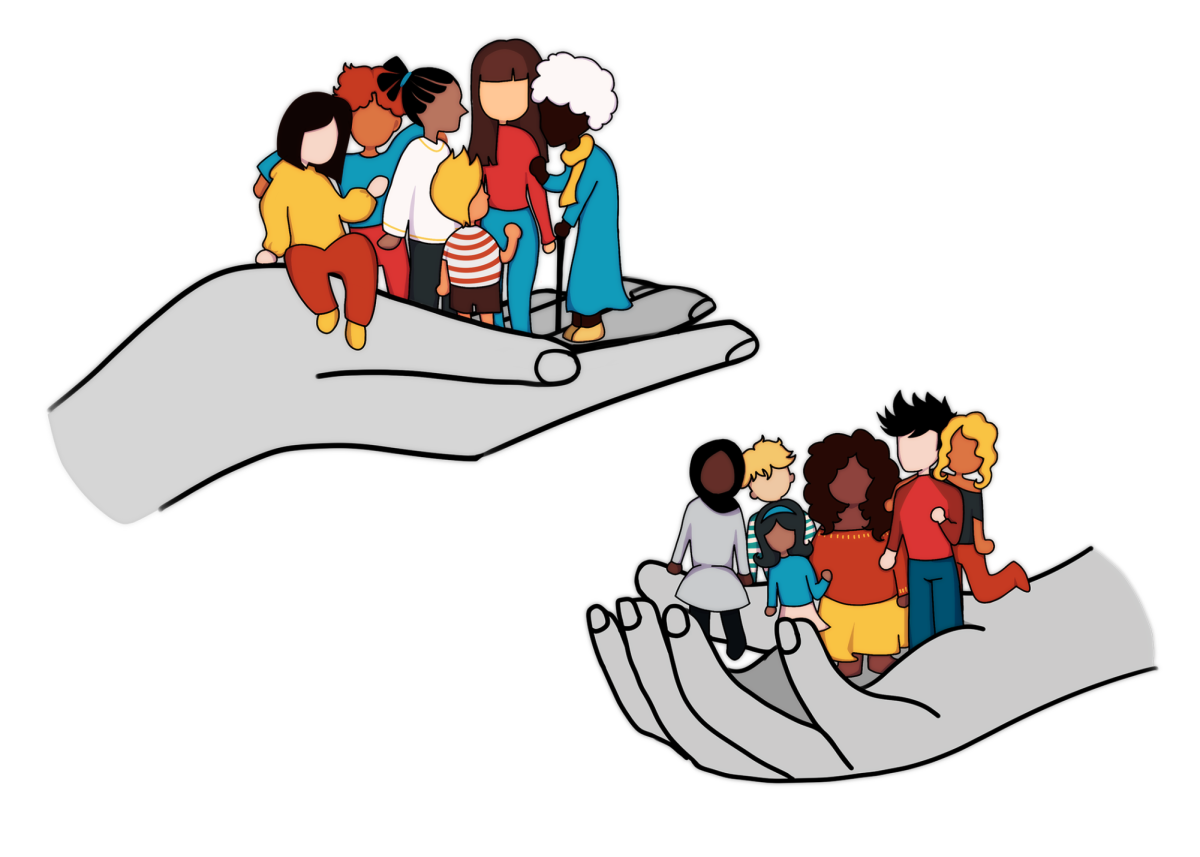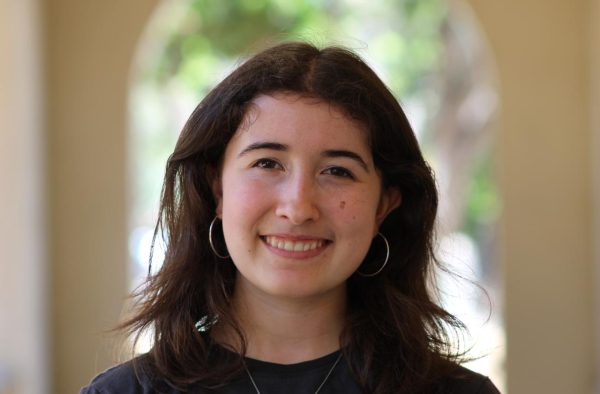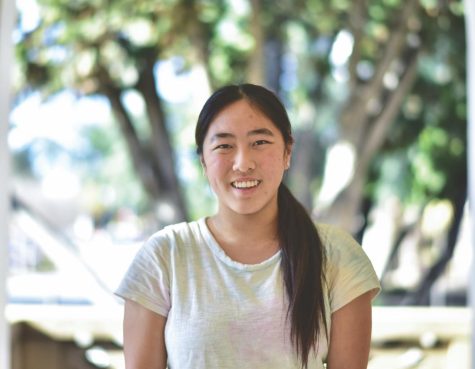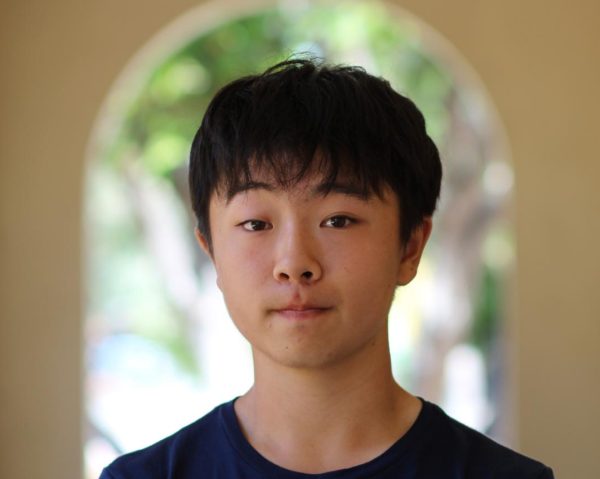As chatter flies across the spread of meals, senior Anna Van Riesen finds herself absorbed in conversations including a variety of cultures, faiths and traditions.
She looks up at her mother, a pastor who organized the gathering, reminiscing over her parents’ profound impact on communities across the world. From practicing Catholicism in Korea to Protestantism in Nigeria, each dinner guest brings a unique perspective to the table.
Van Riesen said growing up in a multicultural church environment enabled her to realize the impact religion has in shaping lives.
“Seeing so many different people in my community who (come from) so many different walks of life was kind of like seeing different models of what my journey could look like,” Van Riesen said.
Religion is defined as the belief and worship of the supernatural, such as a figure like God. According to a 2019 survey conducted by the Pew Research Center, 67% of teenagers ages 13 to 17 in the United States considered themselves to be religious. In the Bay Area, 35% of people actively practice religion, lower than the national average of 84%.
Sociology teacher Benjamin Bolanos said religion helps people understand and find meaning in their lives.
“(Religion) is something we have created as humans to institutionalize values and norms for a world we can’t see,” Bolanos said. “Religion gives us a sense of who we are in this world.”
Bolanos also said religion can be useful for youth specifically because it provides them with structure.
“Religion gives you boundaries,” Bolanos said. “It gives you a sense of belonging (and that) there’s something bigger than you, which for some people is comforting.”
Students’ experiences with religion
Sophomore Ella Segev, who identifies as Jewish, said her religious community is supportive and understanding when she faces challenges.
“All my friends (who) are Jewish understand me in ways that many of my other friends don’t, because we grew up with a lot of the same values, lessons and morals from our parents,” Segev said.
However, senior Betsabe Acosta Ramos, who identifies as Catholic, said she has learned to be critical of the older, more conservative beliefs within her religion. As a result, she said her younger peers have developed their own relationships with God.
“A lot of people within my church are very pro-life, but I know a bunch of other youth like me have very different opinions regarding those kinds of topics,” Acosta Ramos said. “I keep religion close to my heart, but I also sort of have my own ideals. We should be welcoming of all people and not be hateful of anyone, and also allow people to be able to have rights and autonomy over their body.”
Junior Noah Kim, president of Paly Christian Sent Club, said religion has allowed him to gain a meaningful outlook on his life and find joy in the small moments.
“This life is short,” Kim said. “Once I die, I’m going to heaven, so why do I worry about this stuff now? Yes, it’s stressful –– I need to work hard and try my best, but it’s not the end of the world if I don’t (succeed).”
Sophomore Arjun Jindal, who identifies as Hindu, said follows a vegetarian diet because of Ahimsa, a principle of nonviolence and respect for all living things in Hinduism. Jindal said he appreciates the lifestyle and does not mind the restrictions his religion has on his diet.
“My family had an influence on how I personally practice my faith,” Jindal said. “They (taught) me that every soul is the same. (Regardless of my diet), (Hinduism) makes me more mindful of other living things.”
Sophomore Evanllelyn Sanchez Vargas, who identifies as Catholic, said she feels liberated from societal pressures when involved with her faith.
“Religion can be an escape from the stress that teens have in today’s society because when I wasn’t as connected to my faith, I felt a lot more stress,” Sanchez Vargas said. “And when I started connecting more, I felt more liberated.”
Acosta Ramos also said her religion has enabled her to stay culturally connected to her Mexican roots.
“A lot of Mexicans practice religion, even if they loosely practice it, it’s something that’s still very embedded into the culture,” Acosta Ramos said.
Sean Michael Cameron, a religious studies student at Stanford who recently converted to Buddhism from catholicism, said the transition has allowed him to reevaluate his perspective of himself and further discover his identity.
“I found that Buddhist practice was a very helpful set of skills and tools to really get acquainted with myself,” Michael Cameron said. “That helped me learn to be more authentic, or truthful, around other people.”
Segev, who grew up in a secular environment, said being surrounded by others who have different beliefs broadened her perspective and taught her to embrace her Jewish heritage.
“There’s an understanding (that) you have to stick together and you have to be close with your people or else there will not be a community or religious space for us,” Segev said.
Sanchez Vargas said attending a public school has allowed her to explore her faith, while still feeling comfortable enough to talk openly about her religion with others.
“From what I’ve heard from other friends when they go to Catholic schools, they tend to distance themselves later from the religion because they feel like it’s being pushed on them too much,” Sanchez Vargas said. “But (for) me going to a public school, I feel like religion isn’t pushed on me, and it’s my choice to follow it.”
However, freshman Sofia Rodriguez, who also identifies as Catholic, said navigating religion in a public school can be challenging.
“There are parts in academics where it made me question religion because in science when we talk about evolution, it doesn’t really say much about it in the Bible,” Rodriguez said. “I’ve mixed what my education says and what the Bible says to create something for myself.”
Kim said because religion is not discussed in-depth or often enough within PAUSD, the subject can cause tension between him and his non-religious classmates.
“Religion isn’t really discussed since in the Bay Area, (religious people) are a minority,” Kim said. “I do wish that more people were Christian. There are views that I believe in that I know my (non-religious) friends don’t –– there’s a barrier between us.”
While many hold stereotypes about Christians, Kim said he tries not to be influenced.
“There’s pressure from outside friends or people (saying) ‘since you’re a Christian, you’re supposed to be perfect,’” Kim said. “(While) yes, we try to do our best to not sin, we’re still not perfect. We’re still human. Everybody sins and makes mistakes.”
Adults reflect on youth devotion
David Howell, Senior Pastor at the First Congregational Church, said while religion can be an ambiguous concept for younger members of society, youth prefer to practice their faith through tangible means, such as community service.
“Especially in this community, religion is often seen as an exercise in hypocrisy or a waste of time,” Howell said. “Faith for (high schoolers) is actually going out into the world and making a difference. Young people in our church are interested in how faith translates into action in the world and how faith makes a difference in the world.”
Howell said teenagers are likely to spearhead faith-related service events to find their individual purposes within the larger umbrella of religion.
“If you go help somebody, serve meals to somebody or build something for somebody, you know that it mattered that you were there,” Howell said.
Samina Sundas, Executive Director of the American Muslim Voices Foundation, said service holds a fundamental place within Islam. She said these beliefs have guided her approach to motherhood, ensuring her children value aiding others.
“Islam teaches you to be the best human being you can be,” Sundas said. “My religion teaches me to reach out to other people and build friendships. It says, ‘if you save one life, it is as if you have saved humanity.’ I raised (my children) with my Islamic values so if they see somebody here who needs something, they would stop whatever they’re doing and take care of (them).”
Christy Augustine, a Paly parent who identifies as Catholic, said that Catholicism teaches youth important lessons.
“(Catholicism) can help you establish very good values in life and understand a sense of community, a sense of contributing to the world like service work and a sense of what it means really to take care of others,” Augustine said. “Those are all very valuable things that religious communities offer as you’re growing up.”
David Booth, Rabbi of Kol Emeth Congregation, also said many teenagers view religion as a subcategory of their identity, which is different from other age groups.
“Judaism is a very powerful and frequently accessed app within their system of thought, but it’s one app among many, so it’s not always opened as often and it doesn’t necessarily influence the way they may engage with other things,” Booth said. “Because it’s an app, you can then go to another app when it’s an operating system. You’re always operating within it to some degree.”
Uzma Minhas, a Paly parent who identifies as Muslim, said her children had a positive experience regarding religion within PAUSD.
“There was a PE teacher who actually emailed (me) saying that he was going to accommodate my kids, and even talked about the benefits of fasting during the class,” Minhas said. “(My children) had teachers that have just been so sensitive during the month, and have asked ‘is it okay if I bring in snacks?’ during Ramadan.”
However, Minhas said she recently noticed a negative change in attitude towards Muslim students in PAUSD.
“I’ve lived in Palo Alto for over 10 years now,” Minhas said. “(My religious experience) was always positive, but the last few months have been very challenging with the rise in Islamophobia, anti-Arab and anti-Palestinian hate.”
Misconceptions about religion
Bolanos said although he respects individuals’ faiths and religious beliefs, he is apprehensive of those who impose their values onto others without their consent. He said when individuals begin to examine their own religious identities, their curiosity is often shut down in the name of tradition.
“All of us go through, even if we’re not religious, a period of questioning,” Bolanos said. “What happens in (conservative) institutions is this constant (pressure) making sure people don’t deviate, making sure people stick with the program.”
Bolanos said students should question religion and reconsider their ideology to determine whether they agree with their learnings, and if they want to continue practicing this religion for the rest of their lives.
“It’s surprising to me that kids have any kind of faith at this age,” Bolanos said. “(This is) a period where they’re questioning things and may not really be sure what they believe. I think that’s fine because (religion) is such a private matter. As you’re moving away from your parents, thinking what they believe in, and you’re trying to adopt your own values and norms.”
Van Riesen said a common misunderstanding with religion is the belief that students adhere to it solely because their parents are religious and have imposed their values on them.
“I think there are some families that really push religion as something that is like, ‘you’re wrong if you don’t believe what we believe,’” Van Riesen said. “But my parents were like, ‘We want you to believe what you believe because you’ve put a lot of thought and genuinely chose it.’”
Howell said his church includes a diverse group of people. And while Church members learn different methods or approaches to faith from each other, many Christians are often misunderstood as sharing the same perspective on certain issues.
“The Christian Church especially, has the problem that (the) loudest voices within the community (and) country tend to be very conservative,” Howell said. “That doesn’t really reflect our community or our church.”
Instead, Howell said his church values helping others and being inclusive, and that exclusion and condamnation are not true Christian values.
“People who are part of our church are tremendously passionate about serving the community and serving people in need,” Howell said.
Furthermore, Michael Cameron said religion is everywhere, no matter how secular a community attempts to be. Thus, understanding religion can help people analyze political and social structures.
“We’re always in something that we can call a religion,” Michael Cameron said. “It’s an inevitable way in which humans organize ourselves. There’s still a lot to be learned just about very practical affairs, like how our social, economic and political systems work.”
Minhas said learning about different religions can provide people with greater empathy for one another.
“It’s important to know about all the different religions because we live in a global world,” Minhas said. “Having that understanding about all of the religions, but especially some of the largest ones like Islam is really important so you can understand and have cultural sensitivity towards everyone in the world. Regardless of what your personal belief is, I feel that the world is kinder and better when we understand and know about other people’s faiths.”






